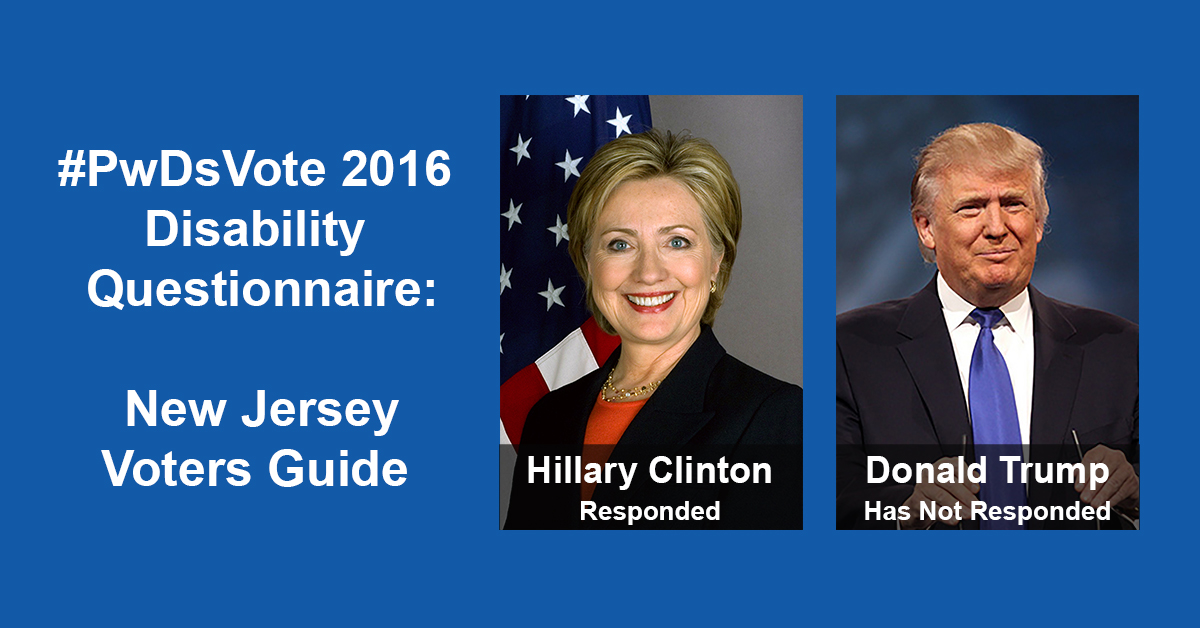Washington, Oct. 14 – As voters get ready to head to the polls in New Jersey, RespectAbility is releasing its New Jersey Disability Voter Guide for the upcoming presidential election. Democrat Hillary Clinton has completed the #PwDsVote Disability Campaign Questionnaire, but Republican Donald Trump has yet to do so.
The #PwDsVote 2016 Campaign Questionnaire was designed by and for people with disabilities (PwDs) and those who love them to know where candidates stand on key issues. RespectAbility is nonpartisan and does not endorse candidates. The questionnaire is purely for educational purposes as voters go to the polls.
According to a new report from Rutgers University, 35.4 million people with disabilities will be eligible to vote in the November 2016 elections, representing close to one-sixth of the total electorate. That’s an increase of nearly 11 percent since 2008.
The presidential questionnaire was created during the primary season and asked all of the presidential candidates to comment on 16 disability questions. Former Secretary of State Hillary Clinton responded by addressing all of the questions. Despite numerous requests in person and by phone and email, the Trump campaign has not yet filled out the questionnaire. The American Association of People with Disabilities and the National Council on Independent Living also has a nonpartisan presidential questionnaire, which both Clinton and Trump have completed. Libertarian Gary Johnson and Green Party candidate Jill Stein have not filled out either questionnaire.
Twenty-three candidates for Senate, as well as nine candidates for governor, from both sides of the aisle (19 Democrats, 13 Republicans) also completed the down ballot questionnaire, showing that disability rights is a nonpartisan issue. The responses also are geographically-diverse, coming from states all around the country, as politicians are paying more and more attention to the disability community.
New Jersey Needs to Improve Outcomes for Citizens with Disabilities
There are 935,833 people with a disability living in New Jersey, of whom 409,000 are of working age (between the ages of 21 and 64). There are an additional 20,300 people ages 16-20 with disabilities, many of whom are hoping to enter the workforce. New Jersey’s voters are looking to know where the candidates stand on important disability issues in order to increase opportunities for competitive, integrated employment for people with disabilities.
New Jersey has the seventeenth highest percentage of employed people with disabilities (39.2 percent), compared with 76.5 percent of people without disabilities. View the rankings of all 50 states and compare.
RespectAbility, founded in 2013, is a nonpartisan, nonprofit organization working to end stigmas and advance opportunities for people with disabilities. It expects outcomes to improve for people with disabilities in New Jersey in the future. RespectAbility has submitted comments for all 50 state’s drafts of the Unified Plan as required under Section 102 of the Workforce Innovation and Opportunity Act (WIOA). New Jersey’s WIOA plan addresses a number of issues concerning people with disabilities and employment. Section 503 of the Rehabilitation Act of 1973 was specifically identified among the goals to further align Vocational Rehabilitation with one-stop career centers. A commitment was also made to take advantage of the new 503 regulations and the seven percent rule – government employers must now attain, or show progress toward attaining, a workforce that consists of at least seven percent of people with disabilities.
New Jersey’s plan also addresses the unique workforce challenges facing ex-offenders as they attempt to reenter society, and was one of the very few states who mentioned this issue in its state plan altogether. The plan provides a summary of the activities being carried out under the Reintegration of Ex-Offenders Program and specifically outlines the workforce development efforts being done to support returning citizens. This is an issue in all states, as those with disabilities and a criminal record have a much more difficult time reaching employment than someone with only one of those characteristics.
New Jersey recently became an Employment First state, which can increase and create more positive outcomes for people with disabilities. An example of this is the strong commitment to expand career pathways for individuals with disabilities and to ensure that an increasing number of individuals with disabilities obtain a postsecondary industry-valued credential or degree.
However, despite this encouraging news, the gap in the labor force participation between people with and without disabilities is still nearly 37.3 percent. While this is lower than 39 other states, the lack of employment for people with disabilities creates poverty, powerlessness and poor health. Polls and studies show that people with disabilities want the opportunity to have the dignity and independence that jobs provide.
America has 1.2 million youth with disabilities, between the ages of 16 and 20. Each year 300,000 of them age into what should be the workforce, but stigmas and lack of knowledge about the capabilities of people with disabilities means that most do not find employers willing to hire them. Young adults with disabilities in all of these states are hoping to find work. They have high expectations and deserve the opportunity to achieve the American dream. Young people with disabilities may simply need some thoughtful help to transition into the workforce. See data on all 50 states here: State Data.
Fully one-out-of-five Americans have a disability, and 52 percent of likely voters have a loved one with a disability. Only 34 percent of working-age Americans with disabilities have jobs, despite the fact that the vast majority want to work. More than 11 million working age people with disabilities are now living on government benefits in our country.
RespectAbility President Jennifer Laszlo Mizrahi said, “Our community is looking for jobs so we can achieve the American dream, just like anyone else. It is vital for us to know where the candidates stand on economic, stigma, education, safety, transportation, housing, healthcare, foreign affairs and other issues.”
Remember to Vote
New Jersey residents can vote for the candidates of their choice either through the standard voting schedule or through early voting. The deadline to register to vote in New Jersey is Oct. 18, 2016. Register online here: New Jersey Voter Registration. Select your county of residence and preferred language to access the registration form. New Jersey does not have early voting, but you can vote by mail (Absentee) by following the instructions here: Absentee Voting. Please note, to receive your ballot by mail, you must apply to the county clerk at least seven days prior to Election Day, Nov. 8, 2016. To find your polling place, please visit this website.





Be First to Comment